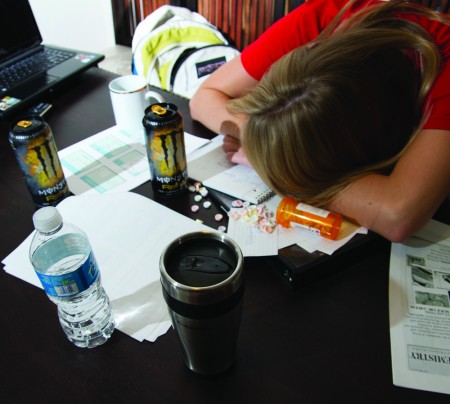
There are many reasons students don’t get enough sleep each night, the most common including schoolwork, having a social life and maintaining a job.
Jacob Roggenbuck, a senior in music industry management, admits that he doesn’t get enough sleep each night.
“I usually get between six and seven hours of sleep a night. It really depends on how busy my schedule is that week,” Roggenbuck said. “People are working jobs and have full class loads, as well as being involved with clubs and RSOs on campus. There’s a lot of homework and things that keep people up.”
Unfortunately, the true dangers of sleep deprivation are not well known. Extreme cases can result in personality changes, heart problems and even death, according to Dr. Meral Topcu, a professor of psychology at Ferris State.
“The way sleep deprivation works is that it reduces the oxygen in the body. It makes you feel tired all the time and unable to concentrate very well, which makes you more prone to more accidents,” Topcu said. “Also, with sleep your body is resting and by having sleep deprivation, you’re not allowing your body to rest properly. After a while you are running on empty, like trying to run a car with no fuel. It’s definitely not good on your body.”
Sleep is critical for people ages 17 through 24. This is because a person’s brain is still being developed until mid twenties, said Topcu.
In 1959, Peter Tripp, a radio personality, set a record for sleep deprivation. He spent 201 hours awake, approximately eight days.
Studies show that he became increasingly disorientated and extremely paranoid. Even after 24 hours of constant sleep, Tripp’s personality had been noted to be altered. He saw hallucinations and was unable to perform simple mental tasks.
“If you deprive an animal long enough, they’ll die,” Topcu said. “We don’t have any studies on human beings, but what happened to Tripp is the best example we have.”
There are many things someone can do in order to avoid struggling from sleep deprivation, including going to bed at the same time every day, creating a constant sleep routine, exercising regularly and avoiding caffeinated drinks and alcohol a few hours before sleep.
“The problem: we are not respecting our body’s need for sleep in this country. If you say, ‘Oh, I couldn’t finish this because I had to sleep last night,’ you will get called lazy. You know?” Topcu said. “Sleep is not an excuse here. We are pushing ourselves so much we don’t have the conscience that we need good sleep.”
